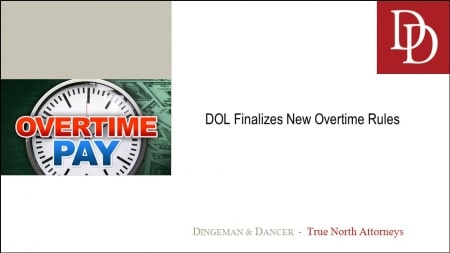
DOL Finalizes New Overtime Exemption Rules
After months of speculation, the U.S. Department of Labor (DOL) finally announced the new regulations that govern the white collar exemptions to overtime pay. These regulations will undoubtedly have a significant impact on many employers and employees when they go into effect on December 1, 2016. Under the white collar exemptions, employees who meet the duties and salary requirements under the new rules are exempt from both the minimum wage and overtime provisions
Contrary to expectations, the DOL made only one change—the agency increased the minimum salary level that an employee must be paid in order to qualify for the exemption. No changes were made to the duties test. The current minimum yearly salary level to qualify is $23,660 per year ($100,000 for certain highly compensated employees). Under the new rules, the minimum annual salary will be $47,476 ($134,004 for highly compensated employees). Employers will also be able to include non-discretionary bonuses and incentive pay in meeting up to ten percent of the salary level test so long as those bonuses and payments are made at least quarterly.
Going forward, the minimum salary level will be adjusted every three years to equal the 40th percentile of weekly earnings of full-time salaried workers in the lowest-wage census region (90th percentile for highly compensated employees). This is a welcome deviation from past practice, where the minimum salary figure was adjusted only when the DOL saw fit to revise it.
Additional information surrounding the new rules can be found at the DOL website.
Now that the new rules are finalized, employers who have not started planning still have an opportunity to properly and cautiously consider all of their options for complying, the implications of complying, and how to prepare supervisors and employees for the impact of working under these new regulations. Those employers who have already started planning can begin the process of implementing changes to ensure compliance—either adjusting pay levels or evaluating how employees earning less than $47,476 will be paid and how they will be compensated for overtime hours worked.
If you have questions or need assistance in understanding or complying with these new regulations, please feel free to contact any of the experienced labor and employment attorneys at Dingeman & Dancer.